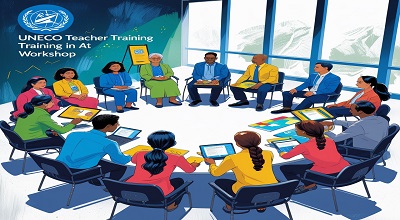UNESCO Teacher Training
UNESCO Teacher Training: UNESCO (United Nations Educational, Scientific and Cultural Organization) plays a pivotal role in shaping global education through teacher training programs. These initiatives aim to enhance teaching methodologies, promote inclusive education, and integrate technology into classrooms. In this comprehensive guide, we will explore UNESCO’s teacher training programs, their impact, and real-world examples.
At TeacherEducator.com, we are committed to providing educators with the latest insights into professional development. This article will cover:
- Overview of UNESCO Teacher Training Programs
- Key Focus Areas of UNESCO Training
- Latest UNESCO Teacher Training Initiatives
- Examples of Successful UNESCO Training Programs
- How to Participate in UNESCO Teacher Training
- Challenges and Future of UNESCO Training
- Frequently Asked Questions (FAQs)
- Multiple-Choice Questions (MCQs) for Self-Assessment
Let’s dive in!
Overview of UNESCO Teacher Training Programs
UNESCO’s teacher training programs are designed to empower educators with skills that align with global educational standards. These programs focus on:
- Pedagogical Innovations – Modern teaching strategies.
- Inclusive Education – Training teachers to support diverse learners.
- Digital Literacy – Integrating technology in classrooms.
- Sustainable Development Goals (SDGs) – Aligning education with global sustainability.
UNESCO collaborates with governments, NGOs, and educational institutions to implement these programs worldwide.
Key Focus Areas of UNESCO Teacher Training
A. Enhancing Teaching Methodologies
UNESCO promotes active learning, student-centered approaches, and critical thinking through teacher training.
Example: The ICT in Education program trains teachers to use digital tools effectively.
B. Promoting Inclusive Education
Teachers are trained to support students with disabilities, refugees, and marginalized communities.
Example: The Inclusive Education Initiative in Africa helps teachers adapt lessons for all learners.
C. Integrating Technology in Classrooms
UNESCO’s Open Educational Resources (OER) program encourages digital learning.
Example: The STEM Teacher Training Initiative in Asia equips educators with tech-based teaching skills.
D. Aligning with Sustainable Development Goals (SDG 4)
SDG 4 focuses on quality education, and UNESCO ensures teachers are trained to meet these goals.
Example: The Global Education Coalition supports teachers in crisis-affected regions.
Latest UNESCO Training Initiatives
A. Global Teacher Campus
An online platform offering free courses on digital skills, gender equality, and climate education.
B. UNESCO-Hamdan Prize for Teacher Development
Awards innovative teacher training programs globally.
C. Teacher Training for Refugee Education
Programs in Jordan, Lebanon, and Turkey help teachers support refugee students.
D. AI in Education Training
UNESCO’s latest focus on Artificial Intelligence for personalized learning.
Examples of Successful UNESCO Training Programs
A. Bangladesh: Enhancing Digital Literacy
UNESCO trained 50,000 teachers in digital tools, improving remote learning during COVID-19.
B. Nigeria: Girls’ Education Initiative
Teachers were trained to reduce gender gaps in STEM education.
C. Brazil: Environmental Education
A program integrating sustainability into school curricula.
D. India: Multilingual Education
Training teachers to deliver lessons in regional languages for better comprehension.
How to Participate in UNESCO Training?
- Visit UNESCO’s Official Website
- Explore online courses on the Global Teacher Campus.
- Apply for scholarships and workshops in your region.
- Partner with local educational institutions for UNESCO-backed programs.
Challenges and Future of UNESCO Training
Challenges:
- Limited funding in developing countries.
- Resistance to technology in traditional education systems.
- Language barriers in multilingual regions.
Future Trends:
- AI-driven teacher training.
- More hybrid (online + offline) programs.
- Stronger focus on mental health training for educators.
Frequently Asked Questions (FAQs)
Q1. Who can apply for UNESCO teachers training?
A: Teachers, educators, and policymakers worldwide.
Q2. Are UNESCO teachers training programs free?
A: Many are free, but some advanced certifications may have fees.
Q3. How do UNESCO programs improve education quality?
A: By training teachers in modern pedagogies, tech integration, and inclusivity.
Conclusion
UNESCO’s teacher training programs are transforming education globally by equipping teachers with modern skills. From digital literacy to inclusive education, these initiatives ensure quality learning for all.
